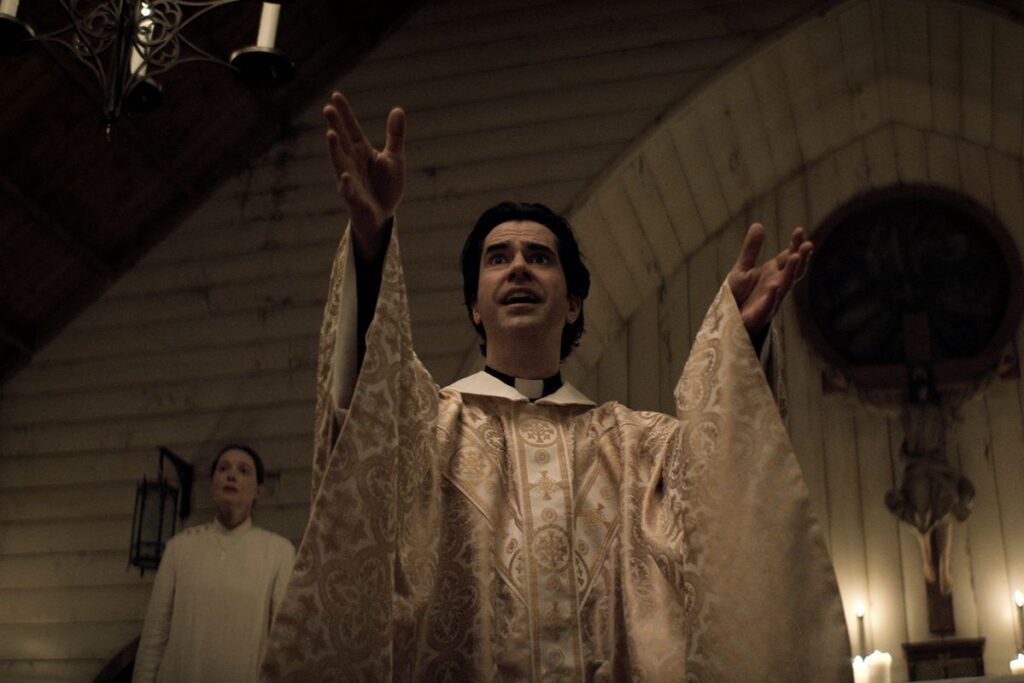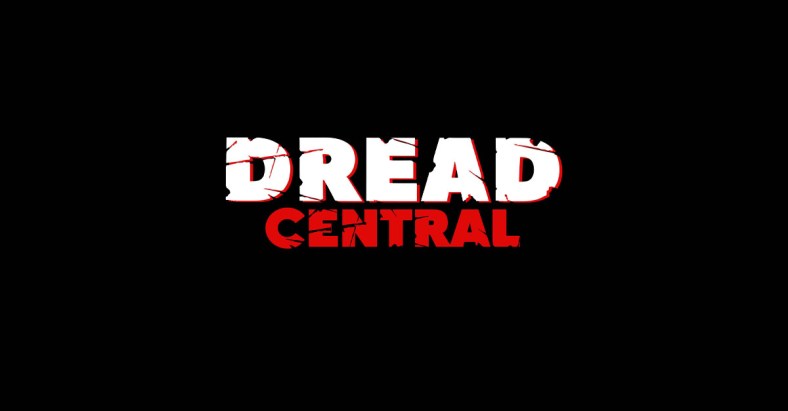The Unholy Transcendence of ‘Midnight Mass’ and ‘Saint Maud’

Editor’s note: this article contains spoilers for Midnight Mass and Saint Maud.
Since the dawn of religion, humankind has sought answers for the absence of a tangible, physical deity onto which to project their faith and devotion. After all, seeing is believing. The ultimate test of religious faith is trusting in a Higher Power despite the seeming indifference of the world at large. A core tenet of most organized monotheistic religions is that God is “transcendent”, meaning he exists beyond the physical world, and therefore beyond human perception. In many of these religions, specifically Christianity, Islam, and Judaism, sacred prayer and worship are considered one of the only ways to achieve closeness to God. These same religions also affirm that God is “imminent”, meaning present within the physical world. This suggests that he is both of this world and surpasses it; present in all things yet existing outside of everything.
There’s a forbidden romance between horror and religion. Many horror movies that dance with religious iconography play with the concept of transcendence. Films such as The Exorcist and The Conjuring deal with transcendent demonic forces; beings that are of Hell yet manipulate the lives of our main characters. But there’s another, slightly different angle of religious horror that taps at an even darker implication: violence as a method of transcendence. Characters who believe experiencing a closeness to God must come with a brutal physical cost. This is a twisted concept found in the more extremist strands of Christianity. Two recent works have tapped into it with horrifying results: Rose Glass’s Saint Maud and Mike Flanagan’s Midnight Mass.
Related: As the Good Book Says: A Post-‘Midnight Mass’ Reading List
Both projects are moody and contemplative examinations of religious delusion. Oftentimes that delusion is used by the characters as a means to atone for past sins and to transcend deeply rooted guilt. As the titular Maud, Morfydd Clark loses herself in bouts of nigh-erotic ritual prayer, motivated by God’s divine presence within her. But when her atheistic private care patient Amanda belittles her faith, she’s driven to the brink of madness in the face of her God’s absence. The certainty of God’s existence is something that Maud desperately clings to. The alternative would suggest that the death she was inadvertently responsible for in her time as a nurse wasn’t part of some miraculous plan; it’s instead on her own hands. Her devotion to her own psychosis has to be awe-inspiring because otherwise, the truth would destroy her.

Similarly, in Midnight Mass, when the aging Monsignor Pruitt (Hamish Linklater) is attacked by a terrifying creature and wakes up looking 40 years younger, he insists upon the idea that his assailant was an Angel of the Lord, even when his own inhuman cravings begin. He trains himself to think of his mutilation as a sublime religious experience. His bloodlust is evidence of the Will of God moving through him. So resolute is Pruitt in his conviction that he begins to share his Angel’s blood amongst his congregation.
Related: Faith and Fear Make ‘Midnight Mass’ An Affirmative Experience
This stirs up their own fervor with supernatural miracles. His drive is one born out of a sincere desire to save his flock. But deep down Pruitt needs for all of this horror to be the will of God. The gift of eternal life would absolve him of the guilt he feels for abandoning his illicit daughter and hiding from a family behind the priesthood.
As deep as our characters’ flaws run, so equally then needs to be their conviction. Both films examine situations in which our characters seek God’s immanence through some form of physical suffering. Saint Maud digs into the brutal Catholic tradition of self-flagellation, featuring scenes in which Maud pushes the limits of her faith. She kneels on scattered prescription pills and walks long distances with nails tacked into the soles of her shoes. It is body horror stripped back to its most raw interpretation. Her pain is meant to conjure up images of Christ’s crucible on the cross, and the immense suffering he went through to bring salvation to the world. But the movie begs its audience to ask whether Maud’s self-inflicted torture truly beckons the Lord to fill her with his presence, or if it’s her own radical psychotic delusions.
Related: God of Power, God of Fear: Religion and Self-Righteousness in ‘Midnight Mass’
With Midnight Mass, Mike Flanagan seeks out transcendence through another subgenre in horror: vampires. Although Monsignor Pruitt’s intentions are pure, he succumbs to a familiar bloodlust. In what is easily the most horrifying moment in the entire show, the Monsignor drinks hungrily from a fatal wound in the head of recovering alcoholic Joe Collie (Robert Longstreet). It’s repulsive, not just because the show spends so much of its runtime getting you to empathize with Joe’s battle against addiction. It’s because Pruitt truly believes that his compulsion is the will of God.
Just like the symptoms of vampirism, Pruitt’s belief is contagious, to the point where most of the parishioners of his church believe that slaughtering their friends and family is the best way to ensure that God can reside in them as well. Their hunger for blood takes on a disturbing parallel to the Catholic Church’s “mission”—spreading the gospel across the world and bringing new members into its fold. It’s a perfect marriage of the holy and the grotesque. It’s the culmination of a thematic crescendo that finds desperate people indulging in brutal means to find some comfort in the promise of a higher power.
Related: Mike Flanagan Wants YOU To See SAINT MAUD Right Now
And in the end, they do find it. In both Saint Maud and Midnight Mass, the path to transcendence is laid out through fire, although the flames serve wildly different purposes. In Saint Maud, the titular character’s religious psychosis escalates to the point of murder, after a terrifying hallucination in which her former patient becomes a demonic figure taunting her for her lack of faith. Maud’s path ends in self-immolation because at this point it’s the only way for her to confirm her belief. She’s already killed someone who forced her to examine her own self-doubt. Now she has to believe the only way she can experience the glory of God is to leave her mortal coil behind.

Saint Maud is a total perversion of the concept of transcendence. Maud escapes the suffering of the wider world and the guilt she feels deep within herself. But the movie’s final moments end with a shot of her screaming in agony, suggesting that her escape was a false one and a testament to her slow descent into self-hatred and isolation.
Conversely, Midnight Mass frames its fires as a cleansing blaze, clearing a path to enlightenment and salvation. We meet Riley Flynn (Zach Gilford) as a lost soul. He’s struggling with self-forgiveness after accidentally killing a young woman in a drunk driving accident. But when he’s presented with the temptation of eternal life disguised as vampirism, Riley rejects it. He instead embraces the destruction that comes with the rising sun and forges a path for his friends to save the world. Riley’s self-sacrifice is true transcendence—a selfless act that allows him to forgive himself and shed his own inner turmoil.
Related: Chad Collins’ Top 10 Horror Movies of 2021
And after most of the town’s population is turned into creatures of the night during a bloodbath at the church, they don’t find God in murder and chaos. Instead, their comfort comes in their connection to their community. With their town burning behind them and the sun cresting over the horizon, the citizens of Crockett Island recognize their own sins and ask each other for forgiveness. They transcend their guilt and inner conflict by relying on each other for strength in the face of their immediate demise.
The world around us is filled with uncertainty, and religion provides many people with the promise of a guiding hand shepherding them through the chaos. But that promise, just like any power, can be corrupted and perverted, leading good people down dark roads in the search for light amidst the maelstrom. If there is a God looking down upon his creation, it’s comforting to think that the best way to feel his presence is in our interactions with other people. Uncertainty can be lonely, but there is a way to transcend that loneliness. It’s a message found not only in Midnight Mass, but in each of the religions that people turn to for strength and guidance. On Earth, we can find salvation in each other, as long as we’re willing to reach out a helping hand.
Categorized:Editorials News
